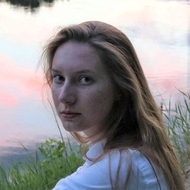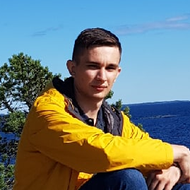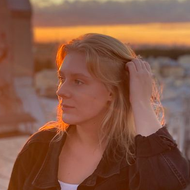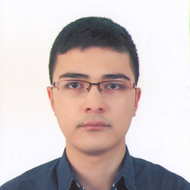'I Have Always Wanted to Be Mediator Between Different Cultures'
It is thought that the 'African and Asian Studies' programme stands among the most difficult ones on campus. And it is definitely known that the programme is one of the most exciting ones, especially for international students. Programme students from different countries tell how a foreigner can enter the programme, and what one should be ready for in the course of one's studies.

Anna Gusakova, a 2nd-year student, the Pridnestrovian Moldavian Republic. Studying the Arabic language.
— Tell us your story about admissions to HSE — St. Petersburg.
I won the HSE Global Scholarship Competition that let me enter the university without taking entrance exams. I had known about this opportunity for a long time, so I took this admission track seriously. When I was studying in the 11th grade, I got sufficient result to go to the chosen programme, and I just had to upload the required documents to the university portal.
— Where did your interest in 'Asian and African Studies' come from? What made you apply to the programme?
My love for the humanities prompted me to choose it. I have always wanted to be a mediator between different cultures, but I did not want to limit myself to studying international relations. The possibility of taking comprehensive studies about East seemed appealing to me. When choosing a specific direction, I did not hesitate: the Muslim world had long been of my particular interest and seemed to be something incredibly distant and fabulous. So I realized I wanted to learn it in more details at a professional level.
— What were the main issues you faced during the admission process and while studying?
I have never had any significant difficulties.
— Tell us about your dormitory, please.
I am living in a remarkable building on Zaporozhskaya street, I like it. The dormitory staff is friendly, and I have nice neighbours.
— As an international student, what have you found unusual in terms of adaptation to a new setting?
There was nothing radically different for me here. Sometimes I was surprised by figures of speech typical for St. Petersburg residents. They made me contemplate their meaning, but it was interesting. At first, I might get slightly upset when some people I talked to were giving cold shoulder and keeping a distance. I grew up in the South, and 'northern people' behaviour seemed to be odd.
— What do you most like and dislike about HSE?
I like that the university is fully engaged in interaction with students. Besides, it has a well-developed information field, corporate online-platforms, and a lot of scientific events. I like that all HSE buildings have a lot of areas where you can study or relax comfortably. I feel comfortable when I talk to university lecturers and administrative staff. I am always glad to see curators, tutors, and I enjoy the possibility of extracurricular activities. Perhaps the only thing I do not like is that we have to take non-field-specific courses (a general cycle of disciplines that are an integral part of university education in Russia — Ed.).
— Is HSE — St. Petersburg a good pick for international students?
I will explain why one should choose HSE — St. Petersburg because I have no arguments against it. First, the university gives you a hand before you have realized that you need it. Secondly, a comfortable environment has been created for international students. Thirdly, HSE has excellent faculty. Fourth, HSE has a large international student body. You may meet both your compatriots and people from every corner of the world.
— What do you expect to get from your studying on 'Asian and African Studies' in the next few years?
I hope to acquire a high-quality knowledge base and maximize positive emotions from my studenthood. I also hope to do an exciting internship or go on a student exchange.

Gleb Istrashkin, a 3-rd year student, the Kyrgyz Republic. Mastering his Japanese.
— Where did your interest in 'Asian and African Studies' come from? What made you apply to the programme?
My interest in the Eastern countries came from my parents and the fact that I used to live in the middle of Asia. My country borders with China.
Besides, I have been into language learning since my childhood, which also affected my decision. Once I examined a programme's leaflet and then realized that the knowledge one could get here is sufficient to find self-fulfilment in many domains ranging from teaching to international relations or diplomatic service.
— What were the main issues you faced during the admission process and while studying?
Actually, I would not say there were any. In Bishkek, the setting is pretty similar to this one. Even though I was living in a student dormitory, it was not easy to find good friends. But this is rather about me because I did not make too much contact at first. Overall, I had been adapting over the first semester, which a bit negatively affected my academic performance, but everything has changed for the better in the second semester.
— Tell us about your dormitory, please.
At first, I had not liked living conditions there, but the information about a forthcoming renovation gave me hope. Indeed, we came back to the same but renovated dormitory in 6 months. I was pleasantly surprised that everything was beautiful and of good quality. I am very happy with my room.
— As an international student, what have you found unusual in terms of adaptation to a new setting?
There was too much bureaucracy, and I was not used to it. I have never been doing so much paperwork, especially when applying for a bank card. It was difficult in the early days, but I got used to these formalities in about a month.
Another difficulty was when I got sick at the very beginning of the module. Although I had an insurance policy, I had no idea of what clinic to go. So I went to see a doctor to a private clinic, and there I got help.
St. Petersburg and my hometown differ in some aspects, and I find particular details in St. Petersburg unusual. For example, black bread is called 'bread' here. I find it funny (In Russia, they usually call wheat bread 'white bread', and rye bread is called 'black bread' — Ed.).
— What do you most like and dislike about HSE?
Most of all, I like that HSE University has a wide network of contacts with other organisations where you can work and evolve. For example, more than 20 or 30 companies attended HSE Career Week, where each student could find a prospective employer. In my opinion, this is a cool and convenient practice.
Another great thing we have at HSE is minors. If you choose a useful one, it may become your future major. I will tell you in secret that the best one is Data Processing and Analysis. It has changed me so much. I did not like programming, but it has become one of my favourite fields now.
— Is HSE — St. Petersburg a good pick for international students?
To start with, the fact that HSE University ranks first in Russia is a good reason to select it. As I said earlier, HSE gives many chances for personal development. Besides, you may meet a lot of goal-oriented people and, for instance, launch your own business or startup together. Even though HSE has some cons, it is not critical, just let them pass. It is worth it.
— What do you expect to get from your studying on 'Asian and African Studies' in the next few years?
I hope I will be given a chance to take an internship in China or Japan, at least for a semester. However, this pandemic makes me think that my dreams will not come true.

Elizaveta Koval, a 4th-year student, the Republic of Belarus. Polishing up her Chinese.
— Tell us your story about admissions to HSE — St. Petersburg.
Initially, I applied to the programme in management, but my overall score was only a point below than required, so I did not receive a tuition fee waiver, which was crucial for my family. I was offered to consider other programmes where an exam in the Russian language carries more weight than Math. Choosing between Law and Asian Studies, I concluded that studying Chinese is more engaging than the Criminal Code, so here I am.
— Where did your interest in 'Asian and African Studies' come from? What made you apply to the programme?
Honestly, I had known nothing about the programme until the summer of 2017, when I visited the HSE — St. Petersburg International Office.
— What were the main issues you faced during the admission process and while studying?
Every examination period is hard when you are a senior-course student: the more you study, the more you revise, the more difficult it is to survive such a week. However, I must say that everything seems much more terrible than it really is before the exams. Besides, you start giving lower priority to your grades with every new academic year. That is how I got rid of all the stress which I had in my first year. I thought that my tin ear would never let me identify four different Chinese phonetic tones.
— Tell us about your dormitory, please.
— I live in a dormitory on Shevchenko street, in the very heart of Vasilyevsky Island. It is great, and there is little to add. Students create a great dormitory atmosphere. I must say that I have met a lot of cool guys over these years, we have grown really close to each other. In the dorm, life is in full swing, so I promise you will have amazing studentship.
— As an international student, what have you found unusual in terms of adaptation to a new setting?
My process of adaptation was mainly to look around a new area. 2GIS application is must-have for foreigners in Russia. I prefer it to Yandex.Maps, but it is a matter of taste.
Ah, I recall a situation that gave away my Belorussian origin. It was the first month I was living in St. Petersburg. I was calling a taxi to the campus building on Kantemirovskaya street. There is no soft consonant 't' in Belorussian (unlike in Russian - Ed.), so initially I called the street in a way funny to Russians — with a hard 't'. When I got into the car, I said it without thinking, and the driver asked me: 'Say again, where to...?'
— What do you most like and dislike about HSE?
I like the faculty and my coursemates. Honestly, I have some difficulties with my studies, but I must say I have never regretted my spontaneous decision about the educational programme.
— Is HSE — St. Petersburg a good pick for international students?
Basically, it is rather good to study here. When your state gives you a chance to get free education in another country, you should take it. The programme 'Asian and African Studies' is taught mainly in Russian, and our international students are from the Customs Union countries, so I find it difficult to answer the question. Students from non-CIS countries interested in Russian culture can apply to the English-taught programmes of HSE University — Saint Petersburg. This city is a place to live a good and exciting life.
— What do you expect to get from your studying on 'Asian and African Studies' in the next few years?
I expect that I will have the possibility to combine work with study in my fifth year. If the epidemiological situation changes, I would like to go on an exchange to China.

Ibrohim Akromov, a 3rd-year student, Uzbekistan. Advancing in the Arabic language.
— Tell us your story about admissions to HSE — St. Petersburg.
I entered the programme 'Asian and African Studies' through the HSE Global Scholarship Competition. This is an annual HSE competition that takes place in many regions, including my country. I became a prizewinner in Asian Studies in October 2017. This is what let me apply for a state-funded place and study at HSE for free. Having had an interview with a programme representative, I got accepted to the 'Asian and African Studies'.
— Where did your interest in 'Asian and African Studies' come from? What made you apply to the programme?
Since the 6th grade, I have been interested in Oriental Studies, to be more precise, in Arabic studies. I had been considering it a priority direction since the 8th grade. The main reasons for it were my interest in Middle East affairs and the desire to study the relations between the Middle East and Central Asia, including Uzbekistan.
— What were the main issues you faced during the admission process and while studying?
There were just some little issues with my paperwork, but the main concern I had was adjusting to a new study rhythm which was much quicker than it was at school.
— Tell us about your dormitory, please.
It has become my second home. There are both positive-minded students and excellent living conditions: we have new furniture and even an in-house laundry.
— As an international student, what have you found unusual in terms of adaptation to a new setting?
It took a year to get used to the cold and rigorous climate of Saint Petersburg. Being a first-year student, I had often been sick with cold, but adaptation was quick. I guess it was so fast because I had studied at secondary vocational-technical school before.
— What do you most like and dislike about HSE?
Most of all, I like the faculty team, whereas my least favourite aspect is the bureaucracy which our university sometimes witnesses.
— Is HSE — St. Petersburg a good pick for international students?
I think so. First, there are state-funded places for international students. Secondly, HSE has a high-quality level of teaching. Thirdly, HSE will help you with self-actualization. The only thing that prevents international candidates from applying here is a reluctance to leave their shell.
— What do you expect to get from your studying on 'Asian and African Studies' in the next few years?
I hope that the university will help me with an internship at one of the most prestigious universities in the Middle East. I also hope to get HSE assistance in applying to a Master's degree programme.

